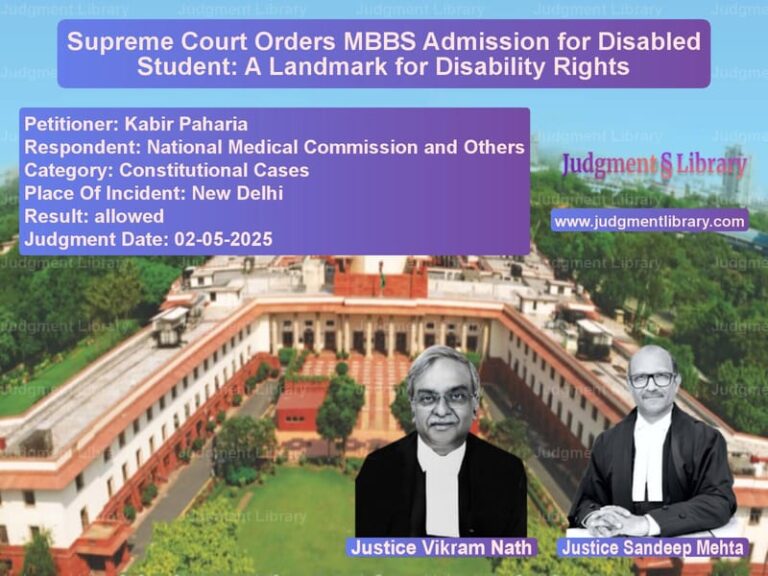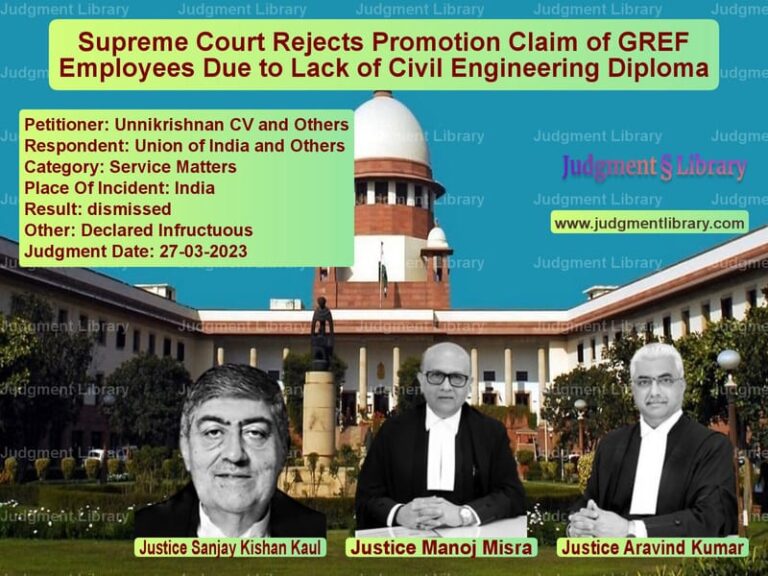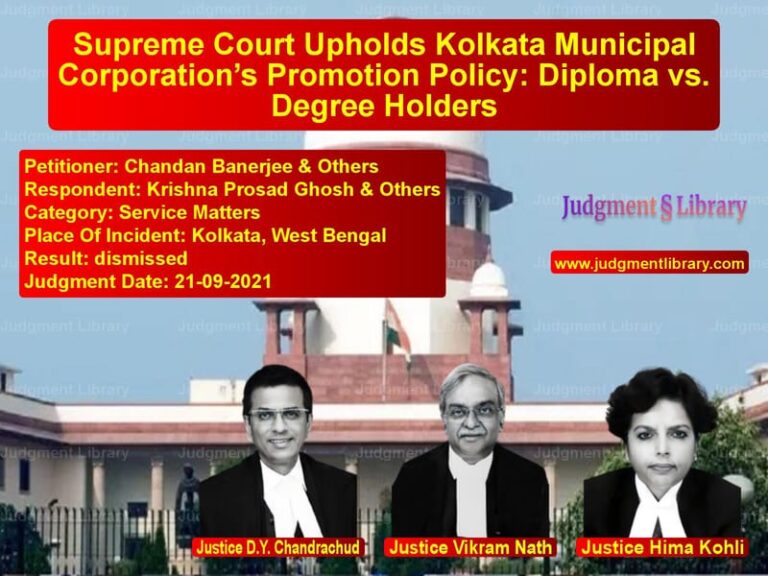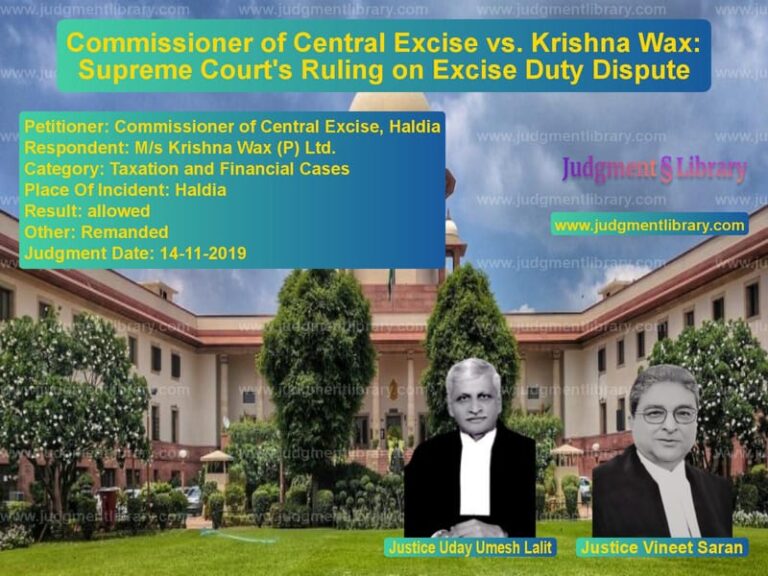Contractual Employment and Termination Rights: Supreme Court Upholds Rajasthan Roadways’ Decision
The case of Rajasthan State Roadways Transport Corporation vs. Paramjeet Singh concerns the termination of a contractual employee and whether such termination required adherence to principles of natural justice. The Supreme Court ruled in favor of the Rajasthan State Roadways Transport Corporation (RSRTC), emphasizing that a purely contractual employment can be terminated as per the terms agreed upon in the contract without the requirement of notice or justification.
The case arose when the respondent, Paramjeet Singh, who was employed as a conductor on a contractual basis, was dismissed by the RSRTC in accordance with the terms of his employment. The Rajasthan High Court ruled in favor of the respondent, citing a breach of the principles of natural justice. However, the Supreme Court reversed the decision, holding that since the employment was purely contractual, no procedural violation had occurred.
Background of the Case
The respondent, Paramjeet Singh, was appointed as a conductor on a contractual basis by the RSRTC on January 21, 2006. The contract specified that his employment would last for one year or until the shortage of drivers was resolved, whichever was earlier. The contract further included two crucial clauses:
- Clause 11: If any passenger was found without a ticket during an inspection, the conductor would be removed from employment, and he would be liable to pay the determined loss amount.
- Clause 16: The employer had the right to terminate the temporary appointment at any time without notice.
On March 21, 2007, RSRTC terminated the respondent’s services without notice, citing the contractual terms that allowed such termination.
Petitioner’s Arguments
The RSRTC, represented by its legal counsel, argued:
- The respondent was hired on a purely contractual basis, and his termination was as per the contract terms.
- The employment contract explicitly stated that the appointment was temporary and could be terminated without notice.
- The High Court erred in applying principles of natural justice to a case where employment was governed strictly by a contractual agreement.
- The reliance on Hari Ram Maurya vs. Union of India (2006) 9 SCC 167 was misplaced because that case involved termination due to a charge of bribery, whereas this case was a simple termination per contract.
Respondent’s Arguments
Paramjeet Singh, the respondent, countered:
- The termination was arbitrary and violated the principles of natural justice.
- Even though the contract allowed termination without notice, fundamental rights and fair procedure should have been followed.
- The Rajasthan High Court correctly applied principles of fairness in employment termination.
Supreme Court’s Analysis
The Supreme Court analyzed whether the termination of a purely contractual employee required adherence to natural justice principles. Key legal observations included:
- The contract was clear that the appointment was temporary and subject to termination without notice.
- Unlike cases where termination is based on allegations of misconduct, contractual employment termination follows agreed-upon conditions.
- The High Court erred in applying natural justice principles to a case that was governed by specific contractual terms.
- Since the respondent was aware of the terms of his appointment, there was no legal ground to challenge the termination.
Key Judicial Findings
The Supreme Court ruled:
- The termination of the respondent’s contractual employment was valid.
- The principles of natural justice did not apply in this case, as the employment was governed by a mutually agreed contract.
- The Rajasthan High Court’s decision was incorrect and was set aside.
- The respondent’s writ petition was dismissed.
- There was no order as to costs.
Conclusion and Impact
The Supreme Court’s ruling reinforces the principle that contractual employment is governed strictly by the terms of the contract. This decision serves as an important precedent, clarifying that termination clauses in contractual employment agreements are legally enforceable and do not require additional procedural safeguards unless explicitly stated.
The ruling provides clarity for employers and employees, ensuring that contractual terms are upheld in cases of employment termination, preventing unnecessary judicial interference in matters governed by contract law.
Petitioner Name: Rajasthan State Roadways Transport Corporation.Respondent Name: Paramjeet Singh.Judgment By: Justice Dhananjaya Y Chandrachud, Justice Hemant Gupta.Place Of Incident: Rajasthan.Judgment Date: 03-05-2019.
Don’t miss out on the full details! Download the complete judgment in PDF format below and gain valuable insights instantly!
Download Judgment: Rajasthan State Road vs Paramjeet Singh Supreme Court of India Judgment Dated 03-05-2019.pdf
Direct Downlaod Judgment: Direct downlaod this Judgment
See all petitions in Termination Cases
See all petitions in Employment Disputes
See all petitions in Contractual Employment
See all petitions in Judgment by Dhananjaya Y Chandrachud
See all petitions in Judgment by Hemant Gupta
See all petitions in allowed
See all petitions in Quashed
See all petitions in supreme court of India judgments May 2019
See all petitions in 2019 judgments
See all posts in Service Matters Category
See all allowed petitions in Service Matters Category
See all Dismissed petitions in Service Matters Category
See all partially allowed petitions in Service Matters Category







